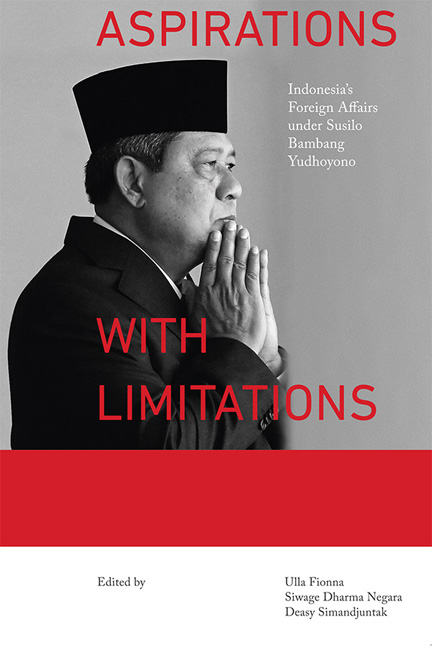Book contents
- Frontmatter
- Contents
- About the Contributors
- 1 Introduction
- 2 Indonesian Foreign Policy: Waging Peace, Stability, and Prosperity
- 3 Indonesia's Diplomatic and Strategic Position under Yudhoyono
- 4 International Economic Cooperation during the Yudhoyono Presidency
- 5 First Term Right, Second Term Shy: A Review of Indonesia's Economic Links with Key Trading Partners
- 6 International Labour Migration: A Very Mixed Blessing
- 7 Law Enforcement, Prevention, and Deradicalization: How SBY Handled Terrorism
- 8 Drifting towards Dynamic Equilibrium: Indonesia's South China Sea Policy under Yudhoyono
- 9 Uneasy Neighbours: Indonesia–Malaysia Relations under Yudhoyono
- 10 A Fair Dinkum Partnership? Australia–Indonesia Ties during the Yudhoyono Era
- 11 The Aceh Peace Process: Wheeling and Dealing behind Closed Doors
- Index
7 - Law Enforcement, Prevention, and Deradicalization: How SBY Handled Terrorism
Published online by Cambridge University Press: 08 June 2019
- Frontmatter
- Contents
- About the Contributors
- 1 Introduction
- 2 Indonesian Foreign Policy: Waging Peace, Stability, and Prosperity
- 3 Indonesia's Diplomatic and Strategic Position under Yudhoyono
- 4 International Economic Cooperation during the Yudhoyono Presidency
- 5 First Term Right, Second Term Shy: A Review of Indonesia's Economic Links with Key Trading Partners
- 6 International Labour Migration: A Very Mixed Blessing
- 7 Law Enforcement, Prevention, and Deradicalization: How SBY Handled Terrorism
- 8 Drifting towards Dynamic Equilibrium: Indonesia's South China Sea Policy under Yudhoyono
- 9 Uneasy Neighbours: Indonesia–Malaysia Relations under Yudhoyono
- 10 A Fair Dinkum Partnership? Australia–Indonesia Ties during the Yudhoyono Era
- 11 The Aceh Peace Process: Wheeling and Dealing behind Closed Doors
- Index
Summary
President Susilo Bambang Yudhoyono (SBY) had to confront a series of terrorist attacks while in office. He built on his experience as coordinating minister for political, legal, and security affairs in the Megawati government (2001–4), when he had to deal with the 2002 Bali bombings and the 2003 bombing of the Marriott Hotel in Jakarta. In his ten years as president (2004–14), Indonesia continued to be plagued by a network of terrorist cells, but the risk of high-casualty attacks receded over time. The SBY government succeeded in managing but not eradicating the terrorism threat, and the decline of terrorist capacity was due to many factors other than government policy. In general, his government did better at rounding up perpetrators once they had committed violence than in preventing radicalization or “immunizing” communities against extremist ideology. This was in part because the police became skilled in crime scene investigation and using sophisticated equipment to track down known suspects. This reactive “hard approach” is almost by definition easier than a proactive “soft approach” of trying to tackle the problem at its roots. But it was also because once an attack had taken place, there was near universal political support for arresting those responsible. Prevention strategies aimed at extremist discussion groups or social media were much more sensitive, and SBY had little appetite for political confrontation. The result was that over his two terms in office, while several hundred suspected terrorists were arrested and over ninety killed in police operations, almost no progress was made on prevention and deradicalization. One consequence was that as a new threat appeared late in SBY's second term in the form of the Islamic State of Iraq and Syria (ISIS) terror group, the government had few good tools or people in place to address it.
The 2002 Bali Bombings: How Counterterrorism Efforts Began
On Saturday night, 12 October 2002, a one-tonne bomb exploded in two clubs, Sari Club and Paddy's Café. The two clubs, the most popular in the area of Legian, Bali, were totally destroyed. Cars and other vehicles in the area were turned into charred ruins. Windows throughout Legian were shattered and the roofs of cafes and homes flew off. In all, 202 people lost their lives and more than 300 were wounded.
- Type
- Chapter
- Information
- Aspirations with LimitationsIndonesia's Foreign Affairs under Susilo Bambang Yudhoyono, pp. 136 - 152Publisher: ISEAS–Yusof Ishak InstitutePrint publication year: 2018

